Refill Revolution, a possibility in Cebu’s Tricities?
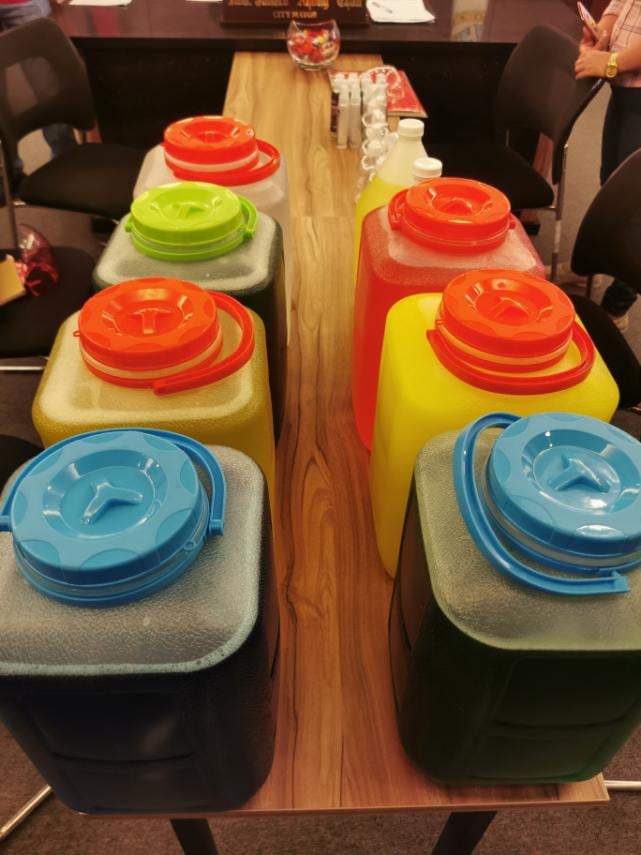
Turned over containers from the Environment Management Bureau to Lapu-Lapu City for the Refill Revolution project. | Courtesy of Lapu-Lapu City PIO
CEBU, Philippines — The three highly urbanized cities at the heart of Metro Cebu produces an estimated 1,096 tons of garbage per day based on the collective records of the cities’ environment offices.
The majority of this garbage bulk, ranging from 37 percent to 100 percent of garbage collected depending on the city, go to the local landfill in Barangay Binaliw in Cebu City.
This means that for the cities of Cebu, Mandaue, and Lapu-Lapu, the estimated garbage generated and thrown in Binaliw per day is at least 872 tons or approximately 26.16 megatons (26,160 tons) per month.
The value varies per day, per season, and per schedule as the tri-cities dispose of their garbage only on certain days.
The Tricities’ City Environment and Natural Resources Offices (CENROs) has also reported decreased garbage production during the pandemic.
The three environmental offices all agree on one thing: solid waste management is one of the biggest challenges in highly urbanized cities.
The three cities have implemented various ways to reduce garbage production, increase diversion of trash away from the landfill, and reduce the amount of garbage thrown into the lone landfill of the area.
Yet Lapu-Lapu City has taken the step further in employing a revolutionary concept that it hopes will significantly reduce the garbage production starting from the individual households.
The Refill Revolution, a project of the Environment Management Bureau in Central Visayas (EMB-7) with the Lapu-Lapu City government, hopes to fund small-time businesses in transitioning to becoming minimal or zero waste stores.
Annabeth Cuizon, the City Social Welfare and Services (CSWS) head of Lapu-Lapu City, said that once implemented, the Refill Revolution should help change the mindset of both residents and tourists in terms of garbage production.
The CSWS will be implementing the project to the barangays and Cuizon hopes that as they begin to plant the roots of the revolution, this will grow into a sustainable industry that would save Lapu-Lapu’s most valuable resource, its beaches.
“Dako kaayo nig tabang kon magsugod ta sa kabalayan og mga tindahan kay kon gamay rag basura ang kolektahon, gamay rag malagpot sa atong landfill. Kung wala nay plastic, wala nay hugaw atong mga dagat,” said Cuizon.
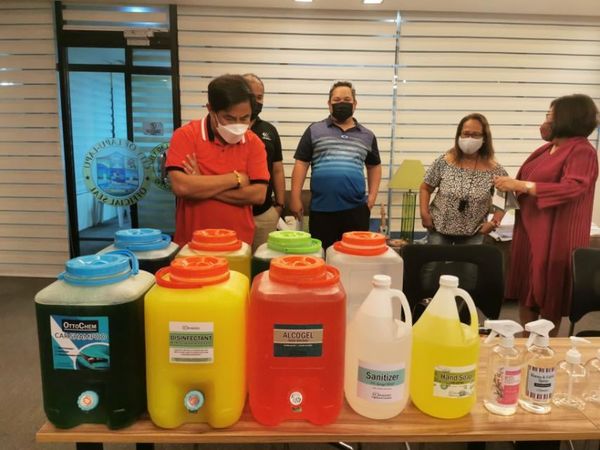
Lapu-Lapu City Mayor Junard Chan checks the turned-over containers from the Environment Management Bureau to Lapu-Lapu City for the Refill Revolution project. | Courtesy of Lapu-Lapu City PIO
Reduction
The goal of the Refill Revolution, Cuizon said, is to primarily reduce the use of plastic among households and establishments by allowing people to bring reusable containers when buying products such as shampoo, conditioners, soap, laundry detergent, cooking oil, condiments, or basically anything that is usually sold in plastic packs.
The first known Refill Revolution project in the country was implemented in San Fernando City, Pampanga, gaining popularity in the city for selling products 50 to 70 percent cheaper through refills than the original packed ones.
San Fernando City has been among the model cities in the country that has managed to garner an 81 percent diversion rate through different programs such as saving discarded resources through composting and selling in junk shops.
According to the Global Alliance for Incinerator Alternatives (GAIA), the Refill Revolution could have contributed to the increasing the diversion rate of the city as selling 100 liters of soy sauce through refills would be equivalent to avoiding the use of 100 1L laminate pouches or 500 200 milliliters (ml) laminate pouches.
Lapu-Lapu City is hoping to institutionalize the program and encourage more stores to employ zero-waste measures through the Refill Revolution movement.
The EMB-7’s memorandum of agreement (MOA) with the Lapu-Lapu City government would grant P1 million in four tranches for the funding of refill stores in the city.
The CSWS is coordinating with the barangays for their women’s organizations as the primary beneficiaries of the project.
As both the city government and the EMB-7 are still finalizing the MOA, the CSWS is still mulling how much will be allotted to each barangay.
“Atong idivide sa lima ka barangays ang first tranche, tag P50,000 each. Of course, dili pa ni final, but mao na atong direction ani nga project,” she said.
As of now, the project is at the information dissemination stage and the CSWS is identifying five viable barangays as pilot areas.
Lapu-Lapu City CENRO head, Engineer Roderico Tagaan, said the project will help the city further reduce its garbage production.
The city, with its 250 tons per day garbage production, throws at least 150 to 170 tons of garbage to the landfill. Of the average 250 tons of garbage collected per day, at least 10 percent are single-use plastics.
Since Lapu-Lapu is a resort city, Tagaan said that the majority of these single-use plastics are sachets, plastic bottles, plastic bags, and similar items.
“Naa man tay MRF (material recovery facility) sa Barangay Soong, nga mosort out sa recyclables pero kasagaran anang single use plastic, labay gyod di naman na marecycle. If mareduce nato ang single use plastic, dako kaayo nang tabang,” he said.
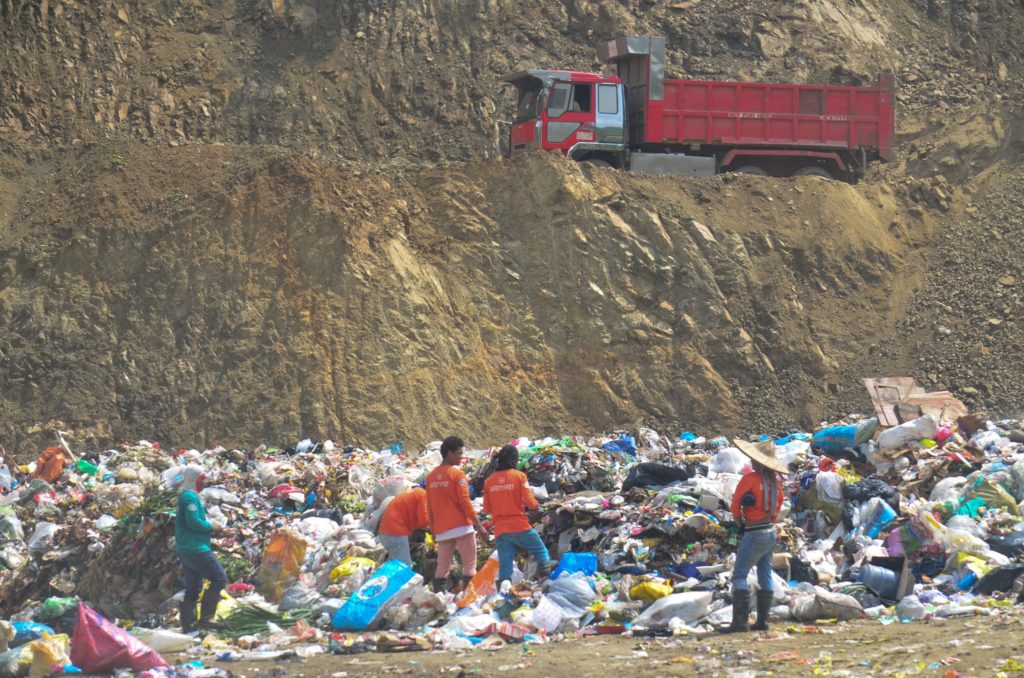
Employees clean up the remaining trash at the landfill located in Barangay Binaliw in this file photo.
Diversion
Mandaue City and Cebu City are yet to accept the challenge of implementing a Refill Revolution in their localities.
Mandaue CENRO head, Architect Araceli Barlam, said that Mandaue City has already established barangay-based diversion programs that have significantly reduced the amount of waste thrown into the landfill.
Mandaue City records a diversion rate of 20 percent for residual wastes, which in turn constitutes 37 percent of the total garbage generated by the city.
This means, 20 tons per day is diverted away from the landfill from the average 276 tons of garbage produced per day in Mandaue City.
Biodegradable waste and recyclable wastes constitute the rest of the garbage collected in the city.
Barlam said that there are 13 barangays with a recycling facility of some kind that focuses on composting and recycling. This has become the livelihood for women in barangays like Subangdaku.
The city also has a partnership with a local recycling company in Tayud, Consolacion town that transforms certain plastics into materials used as cement adhesive.
“Amo na gyod na gischedule nga on certain days molabay ta sa Consolacion sa katong plastic nga ilang dawaton, dayon sa ubang adlaw molabay sa Binaliw,” said Barlam.
Barlam admits there is more to be done to significantly reduce the trash production in the city, but she said they have to be realistic to know that zero-waste would be impossible.
For one, she said that even with the massive cooperation of residents against the use of plastic shopping bags, she said the markets still need to use single-use plastic to pack wet food sanitarily.
This is why a project like Refill Revolution would come in handy if it could change the mindset of the public against using single-use plastic and opting for refilling and bringing their own packages.
“We have not heard much about the Refill Revolution, but if the EMB-7 would guide us, we know that it is possible. Ang mga tawo mosunod man gyod na basta klaro ang balaod og dili out of touch from reality,” she said.
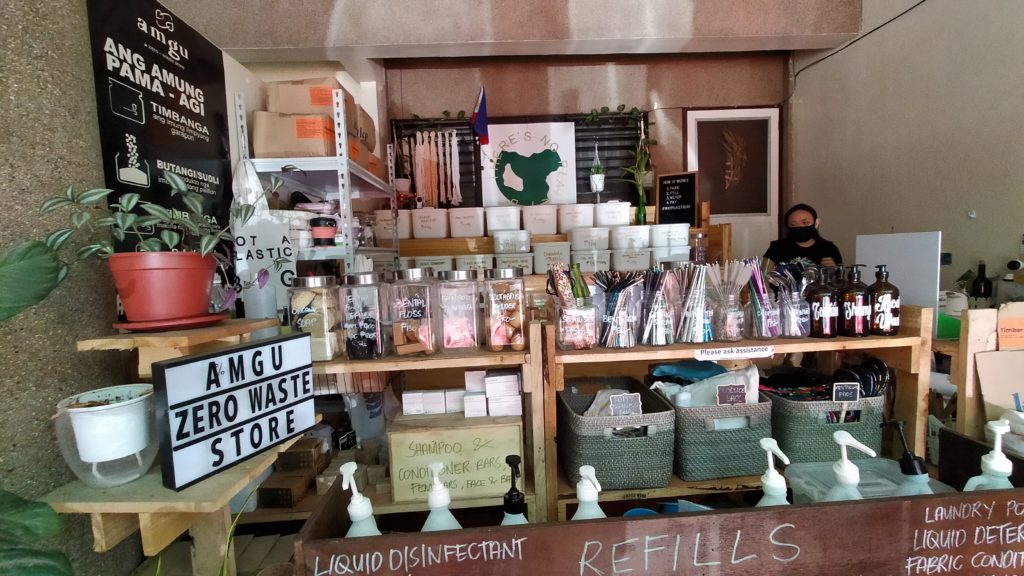
Zero waste store in Cebu City. | Delta Letigio
Zero-waste
Cebu City generates 500 to 700 tons of garbage per day prior to the pandemic and all of these go to the landfill with insignificant diversion.
The city currently lacks an effective MRF, a consistent segregation program, and a clear diversion plan to reduce the garbage thrown into the landfill as compared to its neighboring cities.
Engineer Glory Rose Manatad, the solid waste management division chief of the Cebu City CENRO, said that they are in the process of building an MRF in Barangay Kalunasan, a step in the right direction.
Instead of government-led initiatives, the city’s residents have taken into their own hands the campaign of reducing garbage production.
AMGU, the first zero-waste store in Cebu, began the campaign in 2019 opening its first store in Barangay Kamputhaw at the heart of uptown Cebu City.
Its proprietor, Rangi Joy Madarang, told CDN Digital that the movement sprung from the desire to contribute to the solution to the growing waste problems of Cebu City.
The city has faced various challenges in its solid waste management including the closure of its primary landfill in Barangay Inayawan in 2018 and the opening of another controversial landfill in the Barangay Binaliw.
Madarang said she started AMGU to encourage customers to bring their own containers instead of relying on plastic packaging that “only ends piled up in landfills.”
She sells cleaning materials, hygiene products, spices, nuts, food, reusable containers, ecobags, and other items in her store.
Madarang said she has seen the zero-waste industry growing with other stores popping up in the city as well including the Green Shelf and Kilohan.
She said that putting up a refilling store may take more effort than just putting up another store because people may not be familiar with them yet, but on the business side, the store can be income-generating.
The capital can start as low as P2,000 to P5,000 but sustaining the store can be very minimal because instead of spending so much on packaging, the customers themselves have to bring in their own.
“Tuo man gud nila nga kung refill, di na pwede mopalit og ginagmay parehas sa sachet. Pwede ra gihapon kay pwede man by gram or by ml (milliliter) ilang paliton. Depende gyod na sa diskarte sa naninda,” said Madarang.
Madarang hopes that ordinary stores can slowly transition to refilling as well so that more people can choose to bring their own containers and reduce the garbage production of the city.
She said that even the Carbon Markets vendors can choose to put up refilling stations for cooking oil and other products for those bringing their own containers and providing discounts for customers doing so.
For the proprietor, the Refill Revolution through the support from the government can help vendors and business owners start their zero-waste stores.
“Malipay gyod ko nga modaghan mi, kung kita tanan atong paninguhaon nga magzero-waste ta hangtud sa atong mahimo,” she added.
Manatad said that a project like Refill Revolution is welcome in Cebu City as garbage reduction will be a domino effect in the overall solid waste management plan.
However, she said the priority of the city government must still be in proper segregation and the putting up of an MRF to ensure that whatever garbage ends up on the landfill will be significantly reduced from the collection.
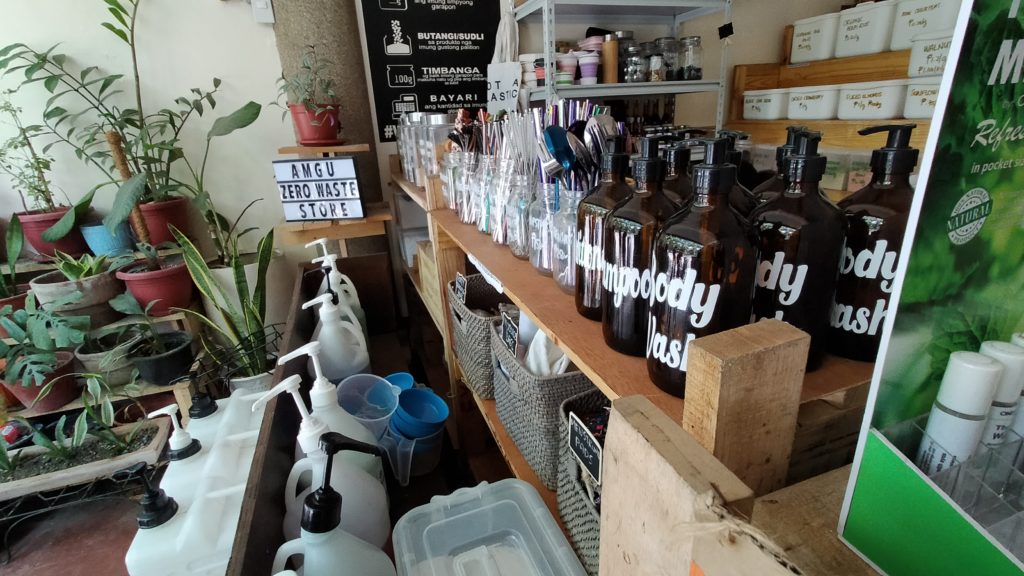
Zero waste store in Cebu City. | Delta Letigio
A step in the right direction
The Tricities’ CENROs all believe that the Refill Revolution can be the movement that will involve the households in actively reducing the amount of garbage produced in the cities.
Lapu-Lapu City is determined to use this movement as a way to protect the seas that have brought its booming tourism industry to the forefront of Cebu’s economy.
Mandaue City does not believe in absolute zero-waste but is open to establishing its own movement in order to reduce waste production.
While in Cebu City, the government does not have the time to implement such a large-scale project and is instead focused on finding a solution to its growing waste crisis through improving its segregation policies and building MRFs.
However, its residents are taking up the challenge themselves and putting up zero-waste stores hoping to make a difference.
For the part of Lapu-Lapu City, Cuizona and Tagaan said they are determined to show Cebu that it can be at the forefront of environmental protection because after all, the environment is what the city banks on. /rcg
Disclaimer: The comments uploaded on this site do not necessarily represent or reflect the views of management and owner of Cebudailynews. We reserve the right to exclude comments that we deem to be inconsistent with our editorial standards.
